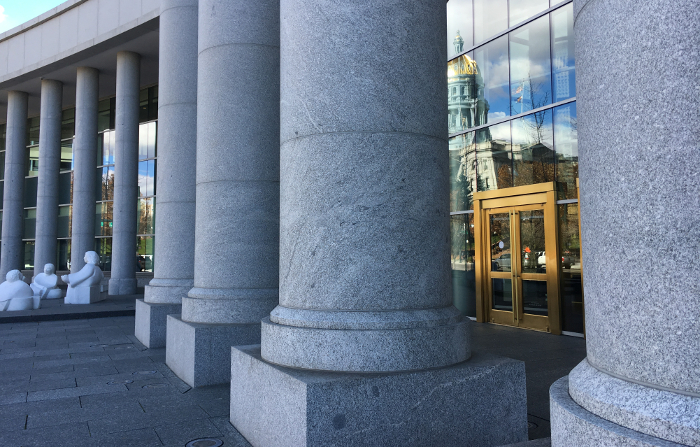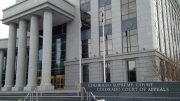Update: The Colorado Supreme Court hearing on proposed Rule 55.1 is now scheduled for 3:30 p.m. on Tuesday, Oct. 13.
By Jeffrey A. Roberts
CFOIC Executive Director
Because of the coronavirus pandemic, the Colorado Supreme Court will wait until September to convene a public hearing on a long-awaited standard for guiding judges’ decisions to seal or suppress judicial records in criminal cases.
In the meantime, the Colorado Freedom of Information Coalition and other groups have submitted written comments on the proposal.

For several years, CFOIC has urged the state’s judicial branch to adopt a uniform standard for restricting access to criminal court records, suggesting a rule modeled after one endorsed by the American Bar Association. A clear rule is needed, we have argued, because each trial court judge in Colorado must determine the legal principle to apply whenever there is a dispute over limiting the public’s right to inspect court records.
The Denver Post focused attention on this issue in 2018, showing that more than 6,000 Colorado court cases had been hidden from public view because of judges’ orders to suppress them, often with no ruling available to explain why a court file was inaccessible. Also that year, The Colorado Independent argued that a district court judge did not sufficiently explain why he sealed records alleging misconduct in the prosecution of a killer who ended up on death row; the judge cited only “countervailing considerations.”
In that case, the Colorado Supreme Court declined to recognize a constitutionally based presumption of public access to judicial records, even though federal appellate courts and other state courts have held that such a right exists under the First Amendment or individual state constitutions.
In its letter, CFOIC lauds the judicial branch’s effort to create a statewide standard. Ensuring that judges articulate in writing their reasons for restricting public access to court records “is a tremendous step forward, not only for the People, but also for the credibility of the judicial branch.”
But as proposed by the judiciary’s 14-member Rules of Criminal Procedure Committee, Rule 55.1 would establish “a markedly lower standard” for denying access to court records than the bar association’s standard, other states’ rules and the holdings of numerous federal and state courts elsewhere, coalition president Steve Zansberg wrote to Chief Justice Nathan Coats on behalf of our organization, the Colorado Press Association and the Colorado Broadcasters Association.
“It is disappointing (the committee) has recommended that merely ‘substantial interest’ would be sufficient to overcome the public’s presumed right of access to judicial records,” the letter says. This lower standard “undervalues the relative weight of the presumption of public access – such that it could be deemed ‘outweighed’ by less-than-compelling governmental interests,” such as avoiding administrative burdens on an underfunded court system.
In comparison, the bar association’s higher standard weighs public access to records against an “overriding interest” like a defendant’s right to a fair trial. Likewise, the holdings of high court cases around the country use terms such as “compelling interest” and “higher values” to characterize interests supporting a denial of access.
Zansberg, a First Amendment lawyer who represents news organizations, acknowledged circumstances that would warrant denying public access to certain criminal court records to protect overriding interests, including the right to a fair trial, the privacy rights of minors and protecting the integrity of an ongoing criminal investigation.
“In all such cases, portions of court records are appropriately withheld from public inspection, provided the requisite judicial findings are made, on the record in a written order, that such compelling interests would be harmed by the disclosure and that no less restrictive alternative means adequately protects such interests,” Zansberg wrote.
The letter urges the Colorado Supreme Court to reject the proposed “substantial interest” standard and instead adopt a “compelling” or “overriding” standard that must be met before the public’s strong presumption of public access to judicial records can be denied.
Zansberg also outlined two additional concerns about proposed Rule 55.1: The proposal would automatically hide motion documents addressing whether public access should be denied and automatically close any judicial hearings convened to resolve such motions.
“We suspect that the Committee intended to place the motion papers presumptively or temporarily under seal, to protect the asserted confidential information from being publicly disclosed, until the sealing motion is resolved,” Zansberg wrote. “But the proposed Rule does not say that; instead it decrees that the entirety of the motion papers is not available for public inspection ‘until otherwise ordered by the Court.’
“Placing the motion papers, in their entirety, outside of public view, without any showing of necessity for such sealing, fundamentally reverses the presumption of public access to all judicial records,” the letter says, citing two federal appellate court rulings regarding access to court records. Parties seeking to deny the inspection of court records should be required to file redacted motions that allow the public to view the legal arguments being made, it adds.
Zansberg also noted that automatically barring the public from attending any hearing on a sealing motion violates the public’s presumptive right under the First Amendment to attend judicial proceedings in criminal cases.
Finally, his letter says, the proposed rule fails to ensure that the public is provided notice of a motion to deny access. The “cryptic” identifiers in the registers of action available on CoCourts.com “are fundamentally inadequate to apprise the public that one or more parties … is seeking to deny the public’s right to monitor the workings of the court.” The public should be given an opportunity to be heard in opposition to a sealing request.
Also submitting comments on proposed Rule 55.1 were the Colorado Clerks Advisory Committee, attorney Caleigh Fite, attorney Kevin McGreevy and the office of State Public Defender Megan Ring. The Colorado Supreme Court hearing is scheduled for 3:30 p.m. on Sept. 22.
Follow the Colorado Freedom of Information Coalition on Twitter @CoFOIC. Like CFOIC’s Facebook page. Do you appreciate the information and resources provided by CFOIC? Please consider making a tax-deductible donation.




